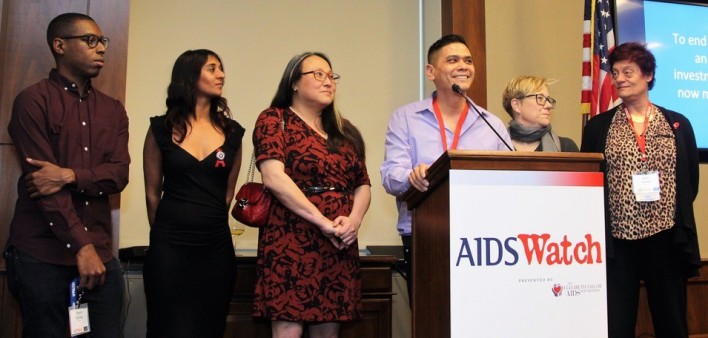The 1983 Denver Principles advised us that people living with HIV/AIDS must “[f]orm caucuses to choose their own representatives, to deal with the media, to choose their own agenda and to plan their own strategies.” We established the United States People living with HIV Caucus to live out that directive.
To have a productive dialogue, it helps to have a common language. When we talk about the meaningful involvement of people living with HIV at the United States People living with HIV Caucus (the HIV Caucus), I have realized that our definition of “meaningful” is not shared across the HIV community. Planning councils, non-profit organizations, clinics, and even other people living with HIV might be content with keeping people living with HIV on a Consumer Advisory Board (or some such group) that meets monthly for a meal and to rubber stamp programs. (I started talking about it online here.)
The Meaningful Involvement of People living with HIV/AIDS (MIPA) is the process of keeping people living with HIV central to the creation and determination of the policies, funding, services, research and initiatives that affect us. On the international stage, the Greater Involvement of People living with HIV/AIDS (GIPA) is used to describe this dynamic. Whether we are talking about MIPA or GIPA, we are centering people living HIV as integral to decision making in the HIV field. It means transparency with power, resources and inclusion; it means not dismissing our concerns and needs as peripheral to the work ahead of us in the epidemic. Our presence, our voice, our choices matter.
My colleague, Texas-based HIV advocate Venita Ray gets frustrated by what she calls “the sandbox” – when people living with HIV are relegated to hospitality, greeting, or non-voting roles in HIV planning rooms. A lot of the work we’ve done at the HIV Caucus is to increase people living with HIV’s awareness of what we can ask for, as well as ways of negotiating power in rooms that are often not built for us. We ask about which people living with HIV are at the table, and whether there needs to be some attention towards those groups often excluded – like people of color, trans* folks, youth, and people with experience in sex work, substance use, and/or the criminal justice system.
In the HIV Caucus, we have started asking a series of questions in our MIPA presentations. Is it “meaningful” if we:
- Are present but don’t have a vote?
- Get information that we don’t have time to process?
- Are asked to be part of meetings where we aren’t part of setting the agenda?
- Are not paid for our time?
- Pretend to speak for whole groups when we attend a meeting as an individual?
- Don’t allow other people living with HIV space at the table?
- Don’t attend a meeting that we’re invited to for input and don’t ask for a replacement?
- Don’t stand up for other people living with HIV when their needs or even identities are discussed?
- Are not invited back when we disagree?
- Do not have the means to sustain a network?
[In case you were wondering, the answer is “NO” to each of these questions.]
This World AIDS Day, a lot of organizations and groups are bringing forward a person living with HIV to talk at an event. Did you pay the speaker? Did you talk with the local group of people living with HIV about the kind of speaker people want? The kind of event? Are you paying attention to the current needs of the local community of people living with HIV? When was the last time the local community was assessed?
I bring this up because you might be surprised at what the local community actually wants on World AIDS Day. Organizations may want to ask the leader they invite in to do a talking session with the local people living with HIV.
With MIPA, it’s important to consider how organizations and people in power hear disagreement. Are you able to hear “no”? How do you know? If you can’t remember the last time someone said “no” on your Community Advisory Board, then you probably do not provide the space for dissent. Every meeting of people living with HIV that I have convened has been full of raucous bonding and tense disagreements. We are not homogeneous and our issues – whether around race, sexuality, gender, socioeconomic class, ability, age, mental health or trauma – come with us into the room.
We partner with AIDS United on a range of projects, including the MIPA-focused funding portfolio the Positive Organizing Project (POP). Now in its fourth year, POP supports grassroots organizing of people living with HIV. Each year we work with the grantees on their exciting projects – which are tightly focused and local in scope. We explain MIPA – to the organizations and to the community of people living with HIV working on the respective POP projects. We share resources on it like this handy MIPA Factsheet. We watch the projects grow. The most successful ones are where the leadership of the organization realizes the ways that MIPA is limited structurally or how it has faded over time. And they renew their commitment. Because MIPA is a dynamic process, requiring attention, focus and resourcing.
The participation of people living with HIV makes a difference for everyone, even when the burden of competing agendas seems overwhelming. Communities begin to transform when organizations seek out the expertise of those impacted, and people living with HIV begin to view ourselves as subject matter experts. It is by the persistent guidance of people living with HIV that we continue to innovate and improve our methods of managing the HIV epidemic.
On this World AIDS Day, as we close out a hard year and look forward to 2018, I invite you to do more about the Meaningful Involvement of People with HIV/AIDS – whether it’s some critical engagement with your own group, or with local community, service providers, media, elected officials. In 2018, I’d love to see more MIPA in the HIV field.








1 Comment
1 Comment